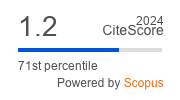Etymological Memory of a Word in Designating Sociocultural Stereotype
DOI:
https://doi.org/10.29038/eejpl.2017.4.1.lyuKeywords:
sociocultural stereotype, initial designation, zoomorphic metaphor, pragmatic presupposition, connotation.Abstract
The article presents the semantic history of the word flapper that denotes social stereotype of American culture. Being a multifaceted phenomenon of semantic cognition, a sociocultural stereotype presents a condensed and coded information that develops on the background of a cultural context. The semantic analysis from diachronic perspective sets up a correspondence of Latin origin of the word flapper with Indo-European stem that produced a number of words in Germanic languages. The cognate words of related languages reveal conformity of negative connotations determined by attitude to human weakness in different forms of its manifestations. This presumes historically determined negative connotation of the word flapper. The initial designation was motivated by kinetic characteristic of the object – a vertical movement. The meaning “a young and daring American girl of the 1920s” of the word flapper was semantically motivated. As it was stated, at the moment of designation, youth and immaturity of a girl were conceived of a fledgling image, that traditionally symbolizes inexperience of a youngster. This zoomorphic metaphor acts as the source of categorization of a cultural and social phenomenon “Flapper”.
References
- Апресян Ю. Д. Избранные труды: Т. 1: Лексическая семантика. Синонимические
средства языка. М.: Языки русской культуры, 1995.
Apresyan, Yu. D. (1995). Izbrannyie Trudy: T.1. Leksicheskaya Semantika.
Sinonimicheskie Sredstva Yazyka [Lexical Semantics. Synonymic Means of Language].
Moscow: Yazyki Russkoy Kultury. - Арутюнова Н. Д. Язык и мир человека. Часть IV: В сторону семиотики и стилистики.
М.: Высшая школа, 1999.
Arutyunova, N. D. (1999). Yazyk i Mir Cheloveka. P. IV: V Storonu Semiotiki i Stilistiki
[Language and Human World. Part 4: Towards Semiotics and Stylistics]. Moscow:
Vysshaya Shkola. - Гумбольдт В. Избранные труды по языкознанию. М.: Прогресс, 1984.
Humboldt, W. (1984). Izbrannyie Trudy po Yazyikoznaniyu [Selected Works in
Linguistics]. Moscow: Progress. - Jackson, F. (1998). From Metaphysics to Ethics. Oxford: Oxford University Press.
- Кифер Ф. О пресуппозициях / Новое в зарубежной лингвистике. М. : 1978, 337–353.
Kiefer, F. (1978). O presuppozitsiyah [On Presuppositions]. In: Novoe v Zarubezhnoy
lingvistike. (337-353), T. M. Nikolayeva, Ed. Moscow: Progress. - Laurence, S., Margolis, E. (2003). Concepts and Conceptual Analysis. Philosophy and
Phenomenological Research, 67(2), 253–282. - McRae, K.; Jones, M. Semantic Memory. (2013). The Oxford Handbook of Cognitive
Psychology. New York, NY: Oxford University Press, 206–216. - Ogden, C.K, Richards, I.A. (1952). The Meaning of meaning. In: A Study of the Influence
of Language upon Thought and of The Science of Symbolism. With Supplementary Essays
by B. Malinowski and F. G. Crookshank. London: Routledge & Kegan Paul. - Partridge, E. (1938).The World of Words: An Introduction to Language in General and to
English and American in Particular. London: George Routledge & Sons. - Пирс Ч.С. Избранные произведения. М.: Логос, 2000.
Peirce, Ch. S. (2000). Izbrannyie Proizvedeniya [Selected Works]. Moscow: Logos. - Потебня А. А. Из записок по русской грамматике. М.: Изд-во Мин-ва просвещения
РСФСР, 1958. - Potebnya, A. A. (1958). Iz zapisok po Russkoy Grammatike [From the Notes on Russian
Grammar]. Moscow: Ministry of Education of RSFSR. - Quiles, C. A., Lopez-Menchero, F. (2009). Grammar of Modern Endo-European. IndoEuropean Language Association.
- Stalnaker, R. C. (1974). Pragmatic Presuppositions. In: Semantics and Philosophy. (pp.
197-230). M. Munitz and P. Unger, (Eds.). N.Y.: New York University Press. - Taylor, J. R. (2006). Polysemy and lexicon. In: Cognitive Linguistics: Current Applications
And Future Perspectives. (pp. 51-81), G. Kristiansen, M. Achard and R. Dirven (eds.).
Berlin–New York: Monton de Gruyter. - Телия В. Н. Коннотативный аспект семантики номинативных единиц. М.: Наука,
1986.
Teliya, V. N. (1986). Konnotativnyiy Aspekt Semantiki Nominativnyh Yedinits [Connotative
Aspect in the Meaning of Denotative Units]. Moscow: Nauka. - Urban, W. M. (2013). Language and Reality. Philosophy of Language and the Principles of
Symbolism. London and New York: Routledge Taylor and Francis Group.
Sources
- A Comprehensive Etymological Dictionary of the English Language (1966). Vol. I. Dr.
Ernest Klein. Barking, Essex: Elsevier Publishing Company. - A Dictionary of Slang and Unconventional English. (1937). E. Partidge. London:
Routledge. - Chamber’s Dictionary of Etymology. (1999). R. K. Barnhart, Ed. N.Y.: Wilson.
- Crawfurd, O. A. (1895). A Year of Sport and Natural History. Shooting, Hunting,
Coursing, Falconry. London: Chapman and Hall. Retrieved from:
https://ia600205.us.archive.org/2/items/cu31924022547263/cu31924022547263.pdf - Dalzell, T. (1996). Flappers to Rappers. American Youth Slang. Springfield,
Massachusetts: Merriam Webster. - Das großen Wörterbuch den Sprach in 10 Bänden, Band 3. (1999). Leipzig–Wien–Zürich:
Dudenverlag, Mannheim. - Deutsches Wörterbuch von Jakob Grimm und Wilhelm Grimm (Nachdruck der
Erstausgabe 1862). (1999). Band 3. München: Lizenzausgabe des Deutschen Tashenbuch
Verlages. - Duden Deutsches Universal Wörterbuch. (2001). Leipzig–Wien–Zürich: Dudenverlag,
Mannheim. - Голландско-русский словарь. Под общ. руководством С. А. Миронова. М.: Гос.
изд-во ин. и нац. словарей, 1954 - Gollandsko-russkiy slovar [Dutch-Russian Dictionary]. (1954). Pod obsch. rukovodstvom
S. A. Mironova. M. : Gos. izd-vo in. i nats. Slovarey. - Green, R. (1970). The Revels Plays. James the IV. Ed. by N. Sandlers. Welwyn Garden
City, Herts: The Broad Water Press. - Indogermanisches Etymologishes Woerterbuch. (1959). Julius Pokorny, (ed). Band
I. Bern: Francke. - Manipulus Vocabulorum: a Rhyming Dictionary of the English Language. (2001).
Ed. H. B. Wheatley. Elibron Classics book a facsimile reprint of a 1867 edition by N. Trübner
& Co. London: Adamant Media Corporation. - Maugham, W. S. (2007). Of Human Bondage. Winnetka, CA: Norilana.
- Норвежско-русский словарь. Сост. В. Д. Аракин. М.: Гос. изд-во ин. и нац.
словарей, 1963











 Creative Commons «Attribution» 4.0
Creative Commons «Attribution» 4.0